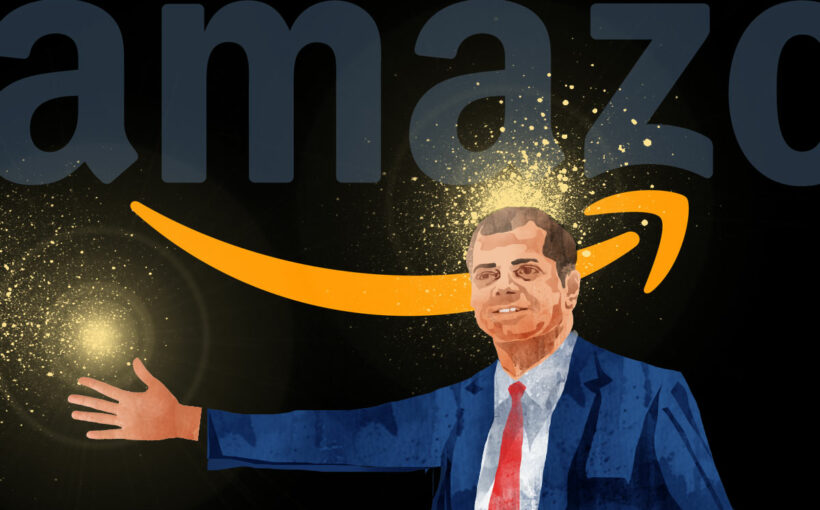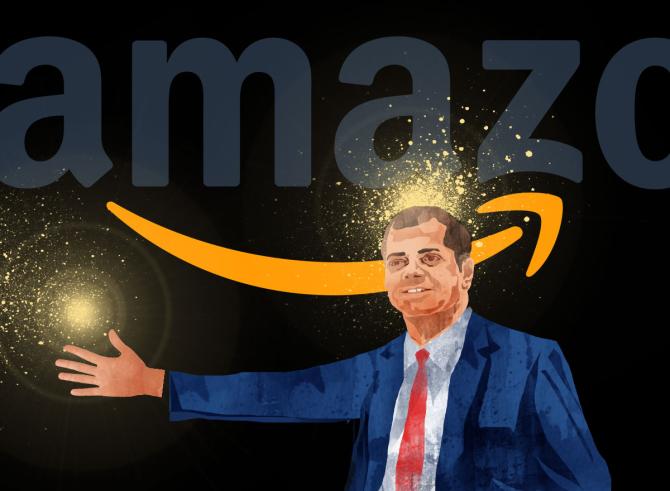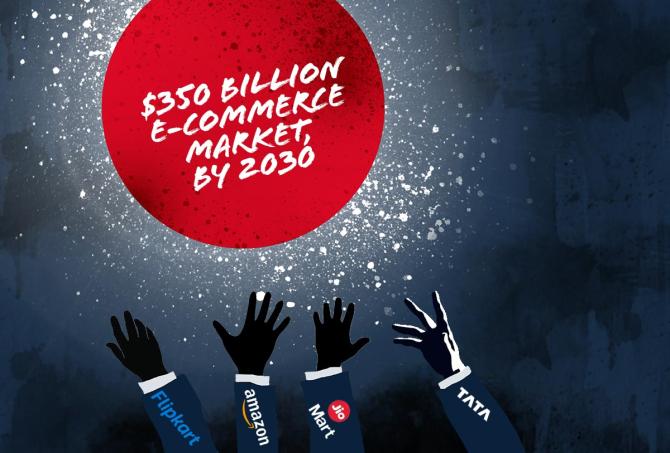‘For all of us at Amazon, it is ‘Bharat first’.’
‘We are keeping the Indian customer at the centre of what we are doing.’
In an office at the World Trade Center in the northwest neighbourhood of Bengaluru, Manish Tiwary is busy sipping black coffee and making strategies for Amazon to change the way India buys and sells.
He was recently elevated as country manager to handle consumer business in India and oversee day-to-day operations at the e-commerce giant.
For Tiwary, 52, who hails from Jamshedpur, Jharkhand, it has been a meteoric rise — the trajectory set in place by the emphasis on education, work and frugality in his growing-up years.
We are meeting virtually, given Tiwary’s tight schedule, even though I am also in Bengaluru.
It is afternoon and I have lunch by my side, but it will lie untouched during our black coffee-laced conversation.
We begin from the beginning: His childhood years, a good part of which was spent in a hostel — from Class 4 to 12 at Delhi Public School, RK Puram, New Delhi. Both his parents worked for the Tatas and their job took them to different parts of the country.
A computer engineer from BIT-Mesra, and an MBA from the Indian Institute of Management- Bangalore, Tiwary, too, was expected to follow them to Tata.
Instead, he took up a job at consumer goods firm Hindustan Unilever in 1995 — “a dream come true,” he says.
“My parents were devastated to know that I would not join the Tata group,” recalls Tiwary.
“They forced me to go for an interview at Tata Steel for a marketing job. As luck would have it, they (Tata) did not accept me. So, that’s what sent me back to selling soap.”
His first posting was at Korba, the industrial hub of Chhattisgarh, where he paid a princely sum of Rs 8 a month as room rent.
At Unilever, Tiwary proved to be a stayer, working with the fast-moving consumer goods major for over two decades in different capacities and across different categories and channels: In India, in the Gulf and in North Africa.
Before joining Amazon in 2016, he headed Unilever’s business in the Gulf region, which was a large multi-country operation across diverse legal entities.
His last role was as managing director for Unilever (Gulf), looking after a cluster of 34 countries in North Africa and West Asia while operating from Dubai.
The role prepped him well for his task at Amazon India, where he now heads an army of over 100,000 employees.
With the pandemic having accelerated the shift to e-commerce, the tech giant is aggressively scaling up its operations.
Under Tiwary’s watch, Amazon is transforming into more than a shopping platform for Indians.
The company started out in India in 2013 with 100 sellers.
It now has over a million from across the country.
It is focusing on vernacular language and a voice-based shopping platform that aims to be inclusive and accessible to the next 500 million users who mainly reside in ‘Bharat’, India’s small towns and cities.
Besides the streaming video and music services it offers, it has launched miniTV, a free, ad-supported video streaming service for Amazon app-users in India who are looking for short films.
It is also betting big on social commerce, tapping social network communities to drive e-commerce sales.
It recently acquired homegrown women-focused social commerce startup GlowRoad for an undisclosed sum.
Amazon Pay, its digital payment arm, is rapidly scaling up its e-payments, credit and financial services.
The company has also forayed into online delivery of food and medicine, plus launched Amazon Academy for students preparing for various examinations.
“For all of us at Amazon, it is ‘Bharat first’,” says Tiwary. “We are keeping the Indian customer at the centre of what we are doing.”
Indeed, at the inaugural Amazon Smbhav summit in January 2020, the company pledged to digitise 10 million micro, small and medium enterprises (MSMEs), generate $10 billion in cumulative exports from India and create 2 million jobs here by 2025.
Tiwary says they’ve already digitised over 4 million small businesses and local stores, are on track to enable $5 billion in cumulative exports and have created over 1.16 million direct and indirect jobs in India, with 135,000 new jobs added in the last one year alone.
While the going is good, there are also some big leadership tests in front of Tiwary.
For instance, trade bodies such as the Confederation of All India Traders and Delhi Vyapar Mahasangh perceive Amazon and Walmart-owned Flipkart as a threat to local retailers and have taken the matter to various courts.
They have alleged preferential treatment to sellers like Cloudtail and Appario in which Amazon had a stake.
In April this year, the investigative arm of the Competition Commission of India reportedly carried out search-and-seizure operations at multiple premises linked to two sellers of Amazon.com Inc, in connection with an investigation launched against e-commerce players over preferential treatment.
Tiwary insists the company treats all its sellers in a fair and transparent manner, and helps every small and medium business.
“If there was any preferential treatment, why would we have a million sellers, and counting?” he asks.
“We are building an infrastructure where a seller sitting in Hosur (Tamil Nadu) can sell products to someone in Arunachal Pradesh.”
“Before e-commerce, who could compete with the well-distributed brands?” he asks. “Take the D2C (direct-to-consumer) unicorns today. I have a feeling that 40 per cent of them are there because of their early success on Amazon.”
Regarding the CCI probe, Tiwary says e-commerce is a new industry that needs a stable policy and that Amazon follows the law of the land.
“The government does understand what we have managed to (achieve),” he says.
“CCI is a government body, and it has every right to get into a few areas. I don’t see it as negative.”
Since 2020, Amazon is also fighting a legal battle with Future Retail to stop the Kishore Biyani-led retailer’s $3.4 billion deal with Reliance Industries Ltd.
Amazon has alleged the deal breached Future’s agreement with the e-commerce firm.
During one of the court hearings in 2020, a lawyer who appeared for Future Retail likened Amazon to East India Company.
Amazon’s lawyer countered this, saying the ‘East India Company’ rhetoric didn’t hold as the e-tailer had invested $6.5 billion across India and created 900,000 jobs.
In December last year, Tiwary too reportedly got summons from the Enforcement Directorate for alleged violation of forex norms when Amazon pumped in Rs 1,431 crore (Rs 14.31 billion) to acquire 49 per cent stake in Biyani’s Future Coupons.
Tiwary was asked to appear since Amazon country head Amit Agarwal reportedly excused himself saying he had moved to the US.
So, has the legal battle with Future impacted Amazon’s growth in India? Tiwary says Amazon’s success in India will be decided by consumers and sellers.
“There are some allegations, but those are misleading attempts by a few people,” he says.
Meanwhile, earlier this year, India soft-launched the open network digital commerce (ONDC) to democratise and transform the e-commerce landscape — and to also check the dominance of US-based players such as Amazon and Walmart, some industry-watchers say. But Tiwary is unperturbed.
E-commerce penetration in India, he says, is very low and Amazon is engaging with ONDC.
The company, he adds, is completely committed to the government’s vision of digitisation, which includes kiranas, local stores, and small and medium businesses.
Amazon is also in a fierce battle with rivals such as Flipkart, Reliance’s JioMart and Tata for a big bite of India’s booming $45-$50 billion e-commerce market, which is expected to touch $350 billion by 2030.
The stakes are high. Tiwary knows that. “We are not in this country for 10-20 years,” he says.
“If you look at what we are building here, it is for the next 50-100 years. So we’re not in a hurry.”
Feature Presentation: Rajesh Alva/Rediff.com
Source: Read Full Article


